一 : 倒装句讲解
倒装句
1. 倒装句之全部倒装
全部倒装是只将句子中的谓语动词全部置于主语之前。此结构通常只用与一般现在时和一般过去时。常见结构:
1) here, there, now, then, thus等副词置于句首, 谓语动词常用be, come, go, lie,run。
There goes the bell.
Then came the chairman.
Here is your letter.
2) 表示运动方向的副词或地点状语置于句首,谓语表示运动的动词。
Out rushed a missile from under the bomber.
Ahead sat an old woman.
注意:上述全部倒装的句型结构的主语必须是名词,如果主语是人称代词则不能完全倒装。
Here he comes. Away they went.
2.倒装句之部分倒装
部分倒装是指将谓语的一部分如助动词或情态倒装至主语之前。如果句中的谓语没有助动词或情态动词,则需添加助动词do,does或did,并将其置于主语之前。
1) 句首为否定或半否定的词语,如no, not, never, seldom, little, hardly, at notime, in no way, not until… 等。
Never have I seen such a performance.
Nowhere will you find the answer to this question.
Not until the child fell asleep did the mother leave theroom.
当Not until引出主从复合句,主句倒装,从句不倒装。
注意: 如否定词不在句首不倒装。
I have never seen such a performance.
The mother didn't leave the room until the child fellasleep.
典型例题 1) ---Why can't I smokehere? ---At no time___ in themeeting-room.
A. is smoking permitted B. smoking is permittedC. smoking is it permitted D. does smoking permit
答案A. 这是一个倒装问题。当否定词语置于句首以表示强调时,其句中的主谓须用倒装结构。 这些否定词包括no, little,hardly, seldom, never, notonly, not until等。本题的正常语序是 Smoking ispermitted in the meeting-room at no time.
2) Not until the early years of the 19th century ___ what heatis.
A. man did know B. man know C. didn't man know D. did manknow
答案D. 看到Not until…的句型,我们知道为一倒装句,答案在C,D 中选一个。
改写为正常语序为,Man did not know what heat is until the early years ofthe 19th. 现在将not提前,后面就不能再用否定了,否则意思就变了。
3.以否定词开头作部分倒装
如 Not only…but also, Hardly/Scarcely…when, Nosooner… than
Not only did he refuse the gift, he also severely criticized thesender.
Hardly had she gone out when a student came to visit her.
No sooner had she gone out than a student came to visit her.
典型例题: No sooner___ than it began to rainheavily.
A. the game began B. has the gamebegun C. did the game begin D. had the game begun
答案D. 以具有否定意义的副词放在句首时,一般采用倒装句(谓语前置)。这类表示否定意义的词有never, seldom,scarcely, little, few, not, hardly, 以及not only…but (also), nosooner…than, hardly… when scarcely… when 等等。
注意:只有当Not only… but also连接两个分句时,才在第一个分句用倒装结构。如果置于句首的Not only…but also仅连接两个并列词语,不可用倒装结构。
Not only you but also I am fond of music.
4. so, neither,nor作部分倒装 表示"也"、"也不" 的句子要部分倒装。
Tom can speak French. So can Jack.
If you won't go, neither will I.
典型例题: ---Do you know Jim quarrelled with hisbrother? ---I don't know,_____.
A. nor don't I care B. nor do I care C. I don't care neither D.I don't care also
答案:B. nor为增补意思"也不关心",因此句子应倒装。A错在用 don't 再次否定, C. neither 用法不对且缺乏连词。D缺乏连词。
注意: 当so引出的句子用以对上文内容加以证实或肯定时,不可用倒装结构。意为"的确如此"。
Tom asked me to go to play football and so I did.
---It's raining hard. ---So it is.
5. only在句首要倒装的情况
Only in this way, can you learn Englishwell.
Only after being asked three times did he come to themeeting.
如果句子为主从复合句,则主句倒装,从句不倒装
Only when he is seriously ill, does he ever stay in bed.
6. as, though引导的倒装句
as / though引导的让步从句必须将表语或状语提前 (形容词, 副词, 分词,实义动词提前)。
注意:1) 句首名词不能带任何冠词。
2) 句首是实义动词, 其他助动词放在主语后。如果实义动词有宾语和状语, 随实义动词一起放在主语之前
Try hard as he will, he never seems able to do the worksatisfactorily.
注意: 让步状语从句中,有though,although时,后面的主句不能有but,但是 though和yet可连用。
7. 其他部分倒装
1) so… that 句型中的so 位于句首时,需倒装。 So frightened was he that he did notdare to move an inch.
2) 在某些表示祝愿的句型中: May you all be happy.
3) 在虚拟语气条件句中从句谓语动词有were, had, should等词,可将if 省略,把 were, had,should 移到主语之前,采取部分倒装。 Were Iyou, I would try it again.
典型例题: 1) Not until the early years of the 19th century___ whatheat is.
A. man did know B. man knew C. didn't man know D. did manknow
答案为D. 否定词Not在句首,要求用部分倒装的句子结构。
2) Not until I began to work ___ how much time I hadwasted.
A. didn't I realize B. did I realize C. I didn't realize D. Irealize 答案为B。
3) ---Do you know Tom bought a new car? ---Idon't know, ___.
A. nor don't I care B. nor do I care C. I don't care neither D.I don't care also
解析:答案为B. 句中的nor引出部分倒装结构,表示"也不"。由 so, neither,nor引导的倒装句,表示前一情况的重复出现。其中, so用于肯定句, 而 neither, nor 用在否定句中。
1. Only in this way _______ progress in your English.
A. you make B. can you make C. you be able to make D.will you able to make
2. Only after liberation _______ to be treated as humanbeings.
A. did they begin B. they had begun C. they did begin D.have they begun
3. Only when the war was over in 1945 _______ to get a collegeeducation.
A. he was able B. he is able C. was he able D. is he able
4. Only when the war was over _______ to his hometown.
A. did the young soldier return B. the young soldierreturned
C. returned the young soldier D. the young soldier didreturn
5. Not until the early years of the 19th century _______ whatheat is.
A. man did know B. man knew C. didn't manknowD. did man know
6. Not until I began to work ______ how much time I hadwasted.
A. didn't I realize B. did I realize C. I didn't realize D.I realize
7.Little _______ about his own safety, though he was in greatdanger himself.
A. does he care B. did hecare C. hecares D. he cared
8. Not until all the fish died in the river _______ how seriousthe pollution was.
A. did the villagers realize B. thevillagers realized C. the villagers did realize D. didn't thevillagers realize
9. I finally got the job I dreamed about. Never in ll my life_______ so happy.
A. did I feel B. Ifelt C. I hadfelt D. had Ifelt
10. No sooner had he finished his talk _______ he was surroundedby the workers.
A. as B.then C.than D. when
11. _______ got into the room, _______ the telephone rang.
A. He hardly had; then B. Hardly had he; when C. He hadnot; than D. Not had he; when
12. The old couple have been married for 40 years and neveronce _______ with each other.
A. they had quarreled B. they have quarreled C. have theyquarreled D. had they quarreled
13. I like sports and _______ my brother.
A. so does B. sois C.so D. so likes
14.She is not fond of cooking, _______ I.
A. so amB. nor am C. eitherdo D. nor do
15.Helen doesn't like milk and _______ .
A. so Idon't B. sodon't I C.either I do D. neither do I
16. ---I don't think I can walk anyfurther. --- _______ . Let'sstop here for a rest.
A. Neither amIB. Neither can I C. I don't thinksoD. I think so
17. ---"Did you enjoy that trip?" ---"I'm afraid not. And_______ ."
A. my classmates don'teither B. myclassmates don't too
C. neither do myclassmatesD. neither did my classmates
18. After that we never saw her again, nor _______ fromher.
A. did wehear B. weheard C. had weheard D. wehave heard
19. ---Do you know Jim quarreled with his brother? ---I don'tknow, _______ .
A. nor don't I care B. nordo I care C. I don't careneither D. Idon't care also
20. So _______ that no fish can live in it.
A. the lake is shallow B. shallow the lake is C. shallow isthe lake D. is the lake shallow
21. Be Quick! _______ .
A. The bus comes here B. The bus here comes C. Here the buscomes D. Here comes the bus
22. On the wall _______ two large portraits.
A. hangs B.hang C.hanged D. hanging
23. _______ , he doesn't study well.
A. As he is clever B. Heis as clever C. Clever as heis D. As clever he is
Key: 1-4BACA 5-12DBBADCBC 13-19 ABDBDAB 20-23 CDBC
答案与解析:
(1)1-4题:only所修饰的状语(副词、介词短语或状语从句)位于句首时,谓语动词要部分倒装。注意:如果only后面不是状语,则不用倒装。例如:OnlyWang Ling knows this.
(2)5-12题:含有否定意义的副词(not until, never, hardly, seldom, little,not, neither, nor, scarcely等)位于句首时,谓语动词要部分倒装。注意:10题、11题的no sooner... than..., hardly...when...句型中,前面的主句用部分倒装,后面的从句不倒装。
(3)13-19题:so位于句首,表示前面的内容也适用于另一人或物时;neither,nor位于句首表示另一人或物也不这样时,谓语动词要用部分倒装。
(4)20题:so... that...结构中表示程度的副词so位于句首时要用部分倒装。
(5)21题: 以here, there, out, in, up, down,away等表示地点方位的副词位于句首时,谓语动词要全部倒装。
(6)22题:为了保持句子结构平衡,或为了强调状语或表语,或使上下文紧密衔接时,谓语动词要全部倒装。
(7)23题:as引导让步状语从句时,表语要倒装,注意:如果从句的表语是可数名词单数,且该名词前又没有形容词修饰时,其名词前不加冠词.例如:Childas he is, he knows a lot.
从以上高考试题和解析可以看出:前20题属于谓语动词的部分倒装(助动词、情态动词、系动词be置于主语前);21和22题谓语动词的全部倒装(整个谓语动词置于主语前);23题表语提前,属于部分倒装。
一、全部倒装
下列情况要使用全部倒装:
1、表示方位的副词(如up,down,in,away,round,here,there)放在句首,句子的谓语动词是表示运动的不及物动词(如go,come,run,rush,fly),主语是名词(注:不能是代词):
In came a girl she had not seenbefore.进来一个她从未见过的姑娘。
Up went the arrow into the air.
Following the roar,out rushed a tiger from amongthe bushes.
Down came the rain and up went the umberllas.
Round and round flew the plane.飞机反复盘旋。
Here comes the train to Beijing.
但主语如果是人称代词,则句子不用倒装,主语仍置于动词之前。
The door opened and in she came.
Away she ran.
Here it comes.
【注】在全部倒装中谓语动词通常用一般现在时或一般过去时,不能用进行时、将来时或完成时。
2、表示时间的副词now,then放在句首,句子的谓语动词是come,主语是名词(不能是代词)。
Now comes your turn.
Then came a new difficulty.
3、介词短语放在句首作状语,句子的位于动词不是及物动词(如lie,stand,sit,exist,stretch,come)或系动词be,主语是名词。
In the doorway stood a man with a gun.
After the banquet came a firework display in thegarden.
On the moon, as is known to all,exists no livingthing.
(To the )south of the river lies a smallfactory.
4、代词such放在句首,句子的谓语动词是be。
Such was laoliu,a simple man and the 21th century’sgreatest scientist.
5、分词短语短语放在句首,谓语动词是be,主语是名词。
Lying on the floor was a boy aged 17.
Seated on the ground are a group of youngpeople.
【注】全部倒装可用于定语从句中。
He suddenly found himself standing at the foot of ahill,on top of which stood an oldtemple.他突然发现自己站在一座山的山脚下,山顶上有个古庙寺。
二、部分倒装
下列情况下,句子使用部分倒装:
1、“only+副词、介词短语或从句”放在句首:
Only then did we realise that the man wasblind.
【注】only后面的状语从句不可用倒装;only 修饰主语时,句子不用倒装。
Only when he returned did we find out thetruth.
Only he can answer the question.
2、含有否定意义的副词(如never,seldom,little,nowhere,hardly等)放在句首:
Never in history has technology made such rapidprogress.
Sledom in my life have I met so determned aperson.
Little does he realize how important the meetingis.
Nowhere will you find better roses than these.
Hardly does it snow here in winter.
3、“not a +n.”“not asingle+n”,“notonce”或“notuntil...”等短语放在句首:
Not a word did he say at the last meeting.
Not a single mistake did he make.
Not once has he failed to keep hispromise.她没有一次不遵守自己的诺言。
Not until I read your letter did I understand theture state of affairs.
4、表示否定意义的介词短语(如at no time,on noaccount,under no circumstances,by no means,in noway等)放在句首:
At no time should you step in to theroom.你绝不能踏进这个房间一步。
On no account must this switch betouched.这个开关绝不能碰。
Under no circumstances could I agree to such aprincple.在任何情况下,我都不同意这一原则。
5、在hardly...when...,nosooner...than...,not only...butalso...,引导的两个分句时,如果把hardly,nosooner,notonly放在句首,前一个分句中的主谓要用部分倒装,后一分局则不用倒装。
Hardly had he begun to speak when his fatherstopped him.
No sooner had I left my house than it begun torain.
Not only will help be given to people to findjobs,but also medical treatment will be provided for people whoneed it.不仅要给找工作的人提供帮助,也会给需要医疗的人提供治疗。
【但】neither/not...nor引导两个分句时,这两个分句的主谓均要倒装:
Neither do I know her address,nor doeshe.我不知道她的地址,他也不知道。
Not could the patient eat,nor could hedrink.那个病人既不能吃也不能喝。
6、在“so+助动词+主语”和“neither/not+助动词+主语”中:
I was late and so was she.
They love having lots of friends,so do those withdisabilities.他们喜欢广交朋友,残疾人也一样。
She won’t go, neither/Nor will I.
I don’t know,nor do I care.
7、在“so+adj./adv+that...”句式中,如将“so+adj./adv”放在句首时:
So moved was she that she could not say a word.
So loudly did he speak that even the people in thenext room could hear him.
8、当if引导的虚拟条件从句中含有助动词had,were或should时,如将if省略,则要将had,were或should等移到主语前:
Had you come yesterday,you would have seen him.
Were I Sanmao, I would refuse.
Should it rain tomorrow,we would put off the sportsmeet.
三、几种特殊形式的倒装
1、在as或though引导的让步状语从句中,常把形容词、名词、副词或动词原形放在句首,这是一种形式的倒装:
Strange as it may seem,he has arrivedearly.尽管看上去很奇怪,他却到得很早。
Child as he is,he knows a lot.
Try as he may(他虽然努力),he will not pass the exam.
2、在whatever,however引导的让步状语从句中,常把形容词、名词、或副词与whatever,however一起放在句首,这也是一种形式的倒装:
Whatever nonsense the newspapers print,some peoplealways believe it.
无论报纸登载的东西多么荒唐,有些人就是相信。
However difficult the problem may be,we must workit out this evening.
3、在the more...themore...句式中,常把the more放在句首:
The more you listen to English,the easier itbecoms.
The harder you work, the greater progress you willmake.
倒装句之全部倒装
倒装句之部分倒装
部分倒装是指将谓语的一部分如助动词或情态倒装至主语之前。如果句中的谓语没有助动词或情态动词,则需添加助动词do,does或did,并将其置于主语之前。
1) 句首为否定或半否定的词语,如no, not, never, seldom, little, hardly, at notime, in no way, not until… 等。
never have i seen such a performance.
nowhere will you find the answer to this question.
not until the child fell asleep did the mother leave theroom.
当not until引出主从复合句,主句倒装,从句不倒装。
注意: 如否定词不在句首不倒装。
i have never seen such a performance.
the mother didn't leave the room until the child fellasleep.
典型例题
1) why can't i smoke here?
at no time___ in the meeting-room
a. is smoking permitted b. smoking ispermitted c.smoking is it permitted d. does smoking permit
答案a. 这是一个倒装问题。当否定词语置于句首以表示强调时,其句中的主谓须用倒装结构。 这些否定词包括no, little,hardly, seldom, never, not only, not until等。本题的正常语序是 smoking ispermitted in the meeting-room at notime. 改写为正常语序为,man did not know what heat is until the early years ofthe 19th. 现在将not提前,后面就不能再用否定了,否则意思就变了。
以否定词开头作部分倒装
如 not only…but also, hardly/scarcely…when, no sooner… than
not only did he refuse the gift, he also severely criticized thesender.
no sooner had she gone out than a student came to visither.
典型例题
no sooner___ than it began to rain heavily.
a. the game began b. has the game begun
c. did the game begin d. had the game begun
答案d. 以具有否定意义的副词放在句首时,一般采用倒装句(谓语前置)。这类表示否定意义的词有never, seldom,scarcely, little, few, not, hardly, 以及not only…but (also), nosooner…than, hardly… when scarcely… when 等等。
注意:只有当not only… butalso连接两个分句时,才在第一个分句用倒装结构。如果置于句首的not only… butalso仅连接两个并列词语,不可用倒装结构。
Not only you but also I am fond of music.
so, neither, nor作部分倒装
全部倒装是只将句子中的谓语动词全部置于主语之前。此结构通常只用与一般现在时和 一般过去时。常见的结构有:
1) here, there, now, then, thus等副词置于句首, 谓语动词常用be, come, go, lie,run。
there goes the bell.
then came the chairman.
here is your letter.
2) 表示运动方向的副词或地点状语置于句首,谓语表示运动的动词。
out rushed a missile from under the bomber.
ahead sat an old woman.
注意:上述全部倒装的句型结构的主语必须是名词,如果主语是人称代词则不能完全倒装。
here he comes. away they went.
英语倒装句讲解
英语句子按主谓排列顺序来分有正常语序和倒装语序。正常语序的结构是“主语+谓语”,倒装语序为谓语(或谓语的一部分)+主语。
倒装语序分为完全倒装和部分倒装两种。完全倒装是将整个谓语移至主语前面。例如:Then comes thebus。部分倒装是只将助动词、系动词或情态动词放在主语之前。例如:Is she an English teacher?
倒装结构的用法:
一、副词here,there, in, out,up ,down, away,back,now, then, ahead等位于句首,当谓语动词是be,come, go,follow,run等表示位置移动的动词,而且主语又是名词时,需要把谓语动词放主语之前,即全部倒装。
注意:A 此类倒装不用进行时态度。B若主语是代词时,不用倒装。
1.--Let's hurry. Listen!There________.
__Oh,yes.Has the teacher come yet?
---Look! Here________.
A the bell goes, is he coming B goes the bell, he comes
C the bell is going,he is coming D goes the bell,comes he
二,含有否定意义的词放句首,部分倒装。
A具有否定意义的副词放句首: not,never,seldom,hardly,rarely.little,scarely,few…
2.I finally got the job I dreamed about.Never in my life___
so happy!(2000,spring)
A did IfeelB IfeelC I had feltD had I felt
3.The old couple have been married for 40 years and neveronce__with each other.(2003)
A they had quarreled B they have quarreled
C have they quarreled D had they quarreled
B,含有否定意义的连词放句首:not only…butalso..,neither..nor.., no sooner…than..,scarely..than..,Hardly..when.., not until...
4.Not until all the fish died in the river__how serious pollutionwas.(95)
A did the villagers realize B the villagersrealized
C the villagers did realize D didn't the villagers realize
5.Not only__interested in football but__ beginning to show aninterest in it.
A the teacher himself is, all his students are
B the teacher himself is, are all his students
C is the teacher himself, are all his students
D is the teacher himself,all his students are
*not only, nosooner,hardly.scarely要倒,but (also),than, when后面的句子不倒.Neither..nor..两部分都倒装。
C, 含有否定意义的介词放句首:by no means, In notime,in no case, on no account,under no circumstances...
On no account must you accept any money against yourconscience.
三,only+状语,部分到装
6.Only in this way__to make improvement in the operatingsystem.(2003 shang)
A you can hope B you did more C can you hope D did you hope
7. __can you expect to get a pay rise.(2001)
A With hard work B Although work hard
C Only with hard work D Now that he workshard
四、表示上文的状况也适合另外一人或事半功倍有下列:
肯定:so+助动词(动/情态)+主语 *主语与上文一致
否定:neither(nor)+助动(动/情态)+主语
8.-David has made great progress recently.
--_______,and________.(1997)
A So he has, so you have B Sohe has, so have you
C So has he , so have you D So has he ,so youhave
9. – You forget your purse when you went out.
---Goodheavens,_______.(2002)
A so didIB so IdidC I didsoD I so did
五、as作“尽管/虽然”,引导让步状语从句,由于语法需要,把表语/状语/动词提于句首.
10._____,I have never seen anyone who's as capable(有能力) asJohn.(2001)
A As long as I have traveled B Now that I havetraveled
C Much as I havetraveled D AsI have travled so much
11.___, he knows a lot of things.
A The child as he isB Child ashe is C A child as he isD Child as he is
六、so ..that.., such..that..的句子结构中,若so,such和与其所修饰的词置于句首,实行部分倒。
12.So difficult____it to live in an English-speaking country that Idetermined to learn English well.(2001)
A I have felt B have I felt C Idid feel D did I feel
七、若if引导的虚拟条件句中有were, had, should时, 可将if省,把were, had, should 放主语之前。
13.__it rain tomorrow, we would have put off the visit to theYangpu Bridge.(94)
A Were BShouldCWouldD Will
14.___ for the tree tickets,I would not have gone to the film sooften.(95sh)
A If it is notB Were it notCHad not it beenD If they were not
八、充当地点状语的介词短语放句首,全倒。
In a lecture hall of auniversity sits a professor.
九、在表示愿望的感叹句,倒装。
May our country become rich andstrong!
Long live the People's Republic of China!
十、There be 句型,eg,
Therelive(stand,appear.seem,remain,exist….)
There is a man at the door wants to see you.
There once lived an old hunter in that house.
There seems to be some misunderstanding about the matter.
二 : 最好倒装句讲解
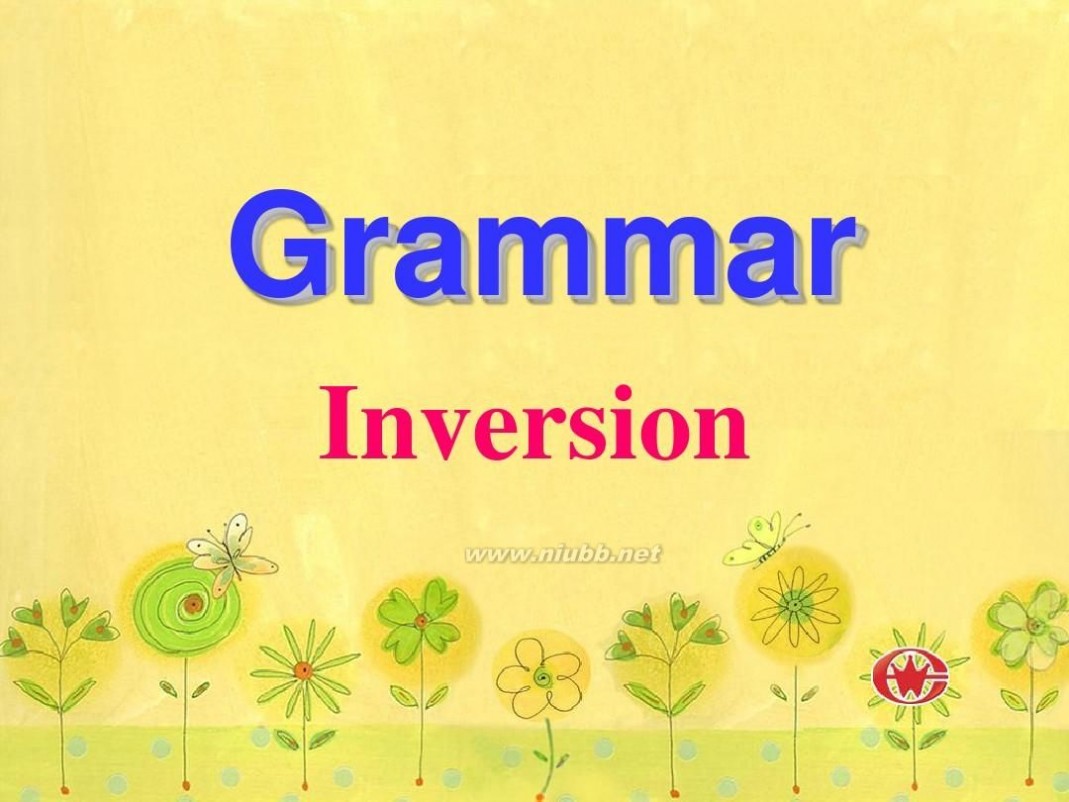
倒装句 最好倒装句讲解
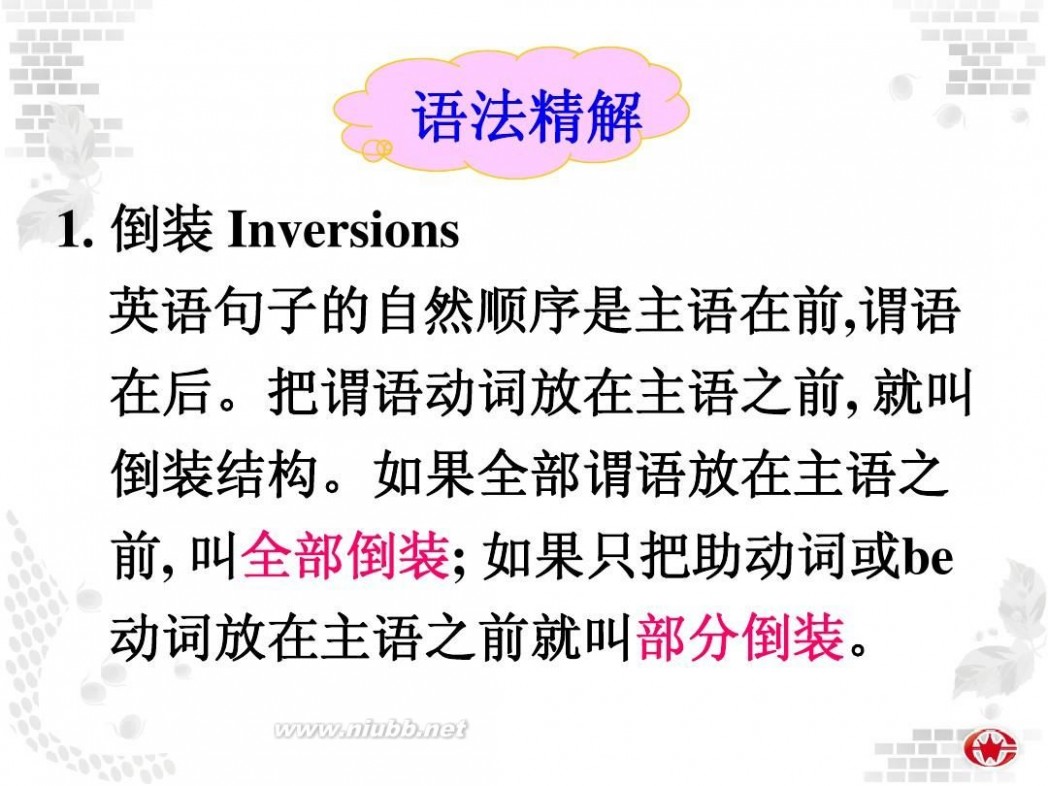
倒装句 最好倒装句讲解
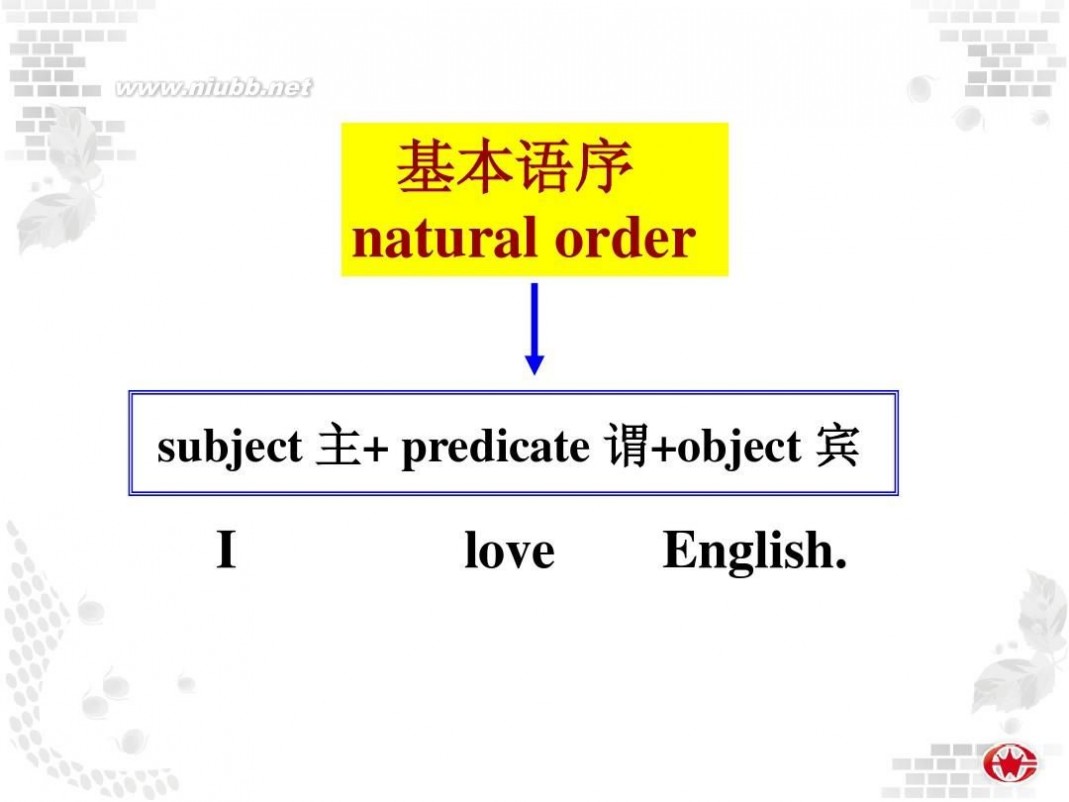
倒装句 最好倒装句讲解

倒装句 最好倒装句讲解
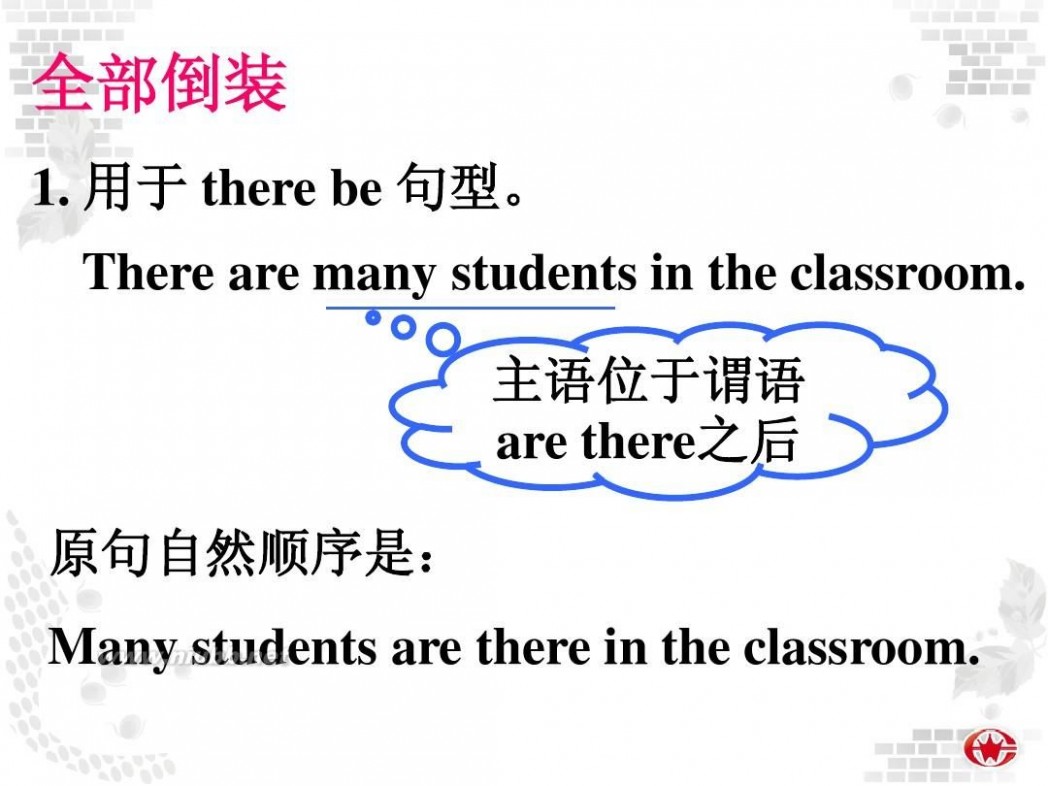
倒装句 最好倒装句讲解
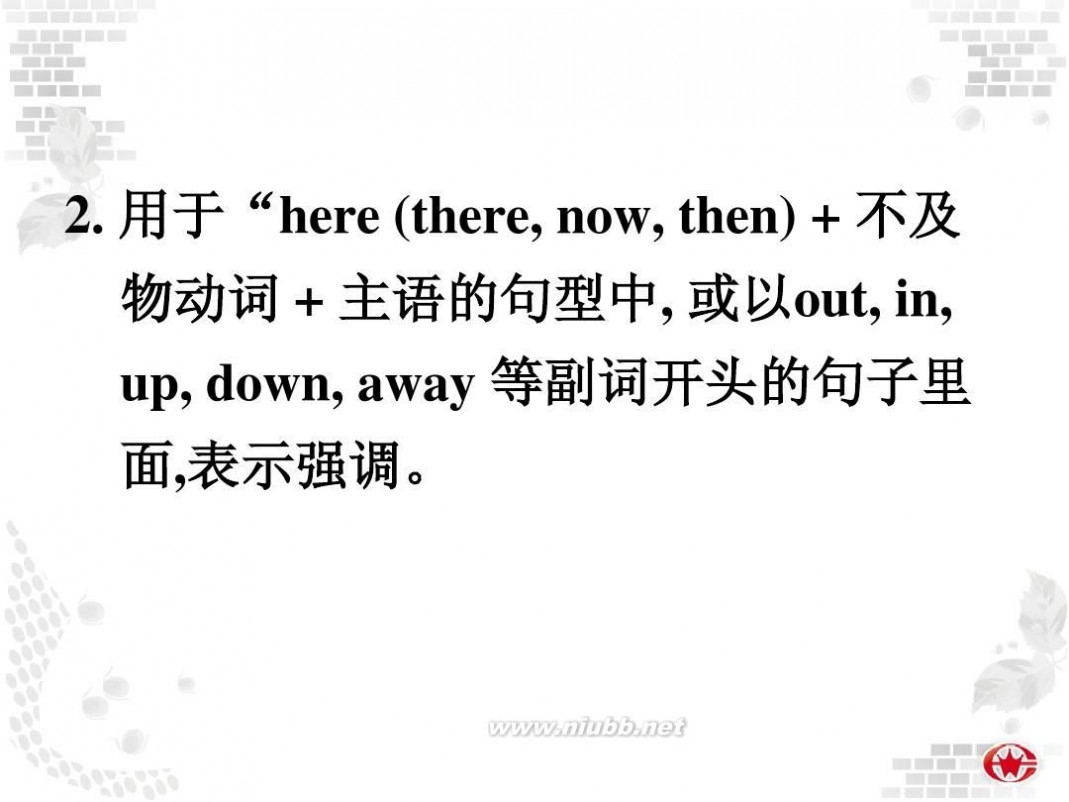
倒装句 最好倒装句讲解
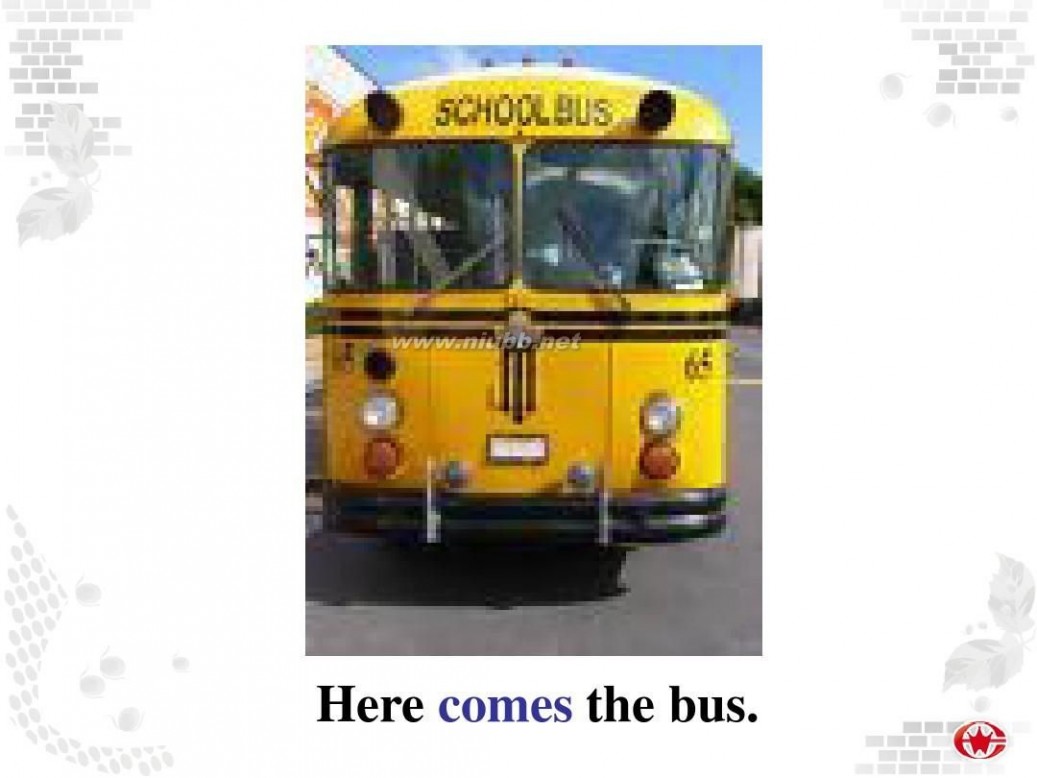
倒装句 最好倒装句讲解

倒装句 最好倒装句讲解

倒装句 最好倒装句讲解
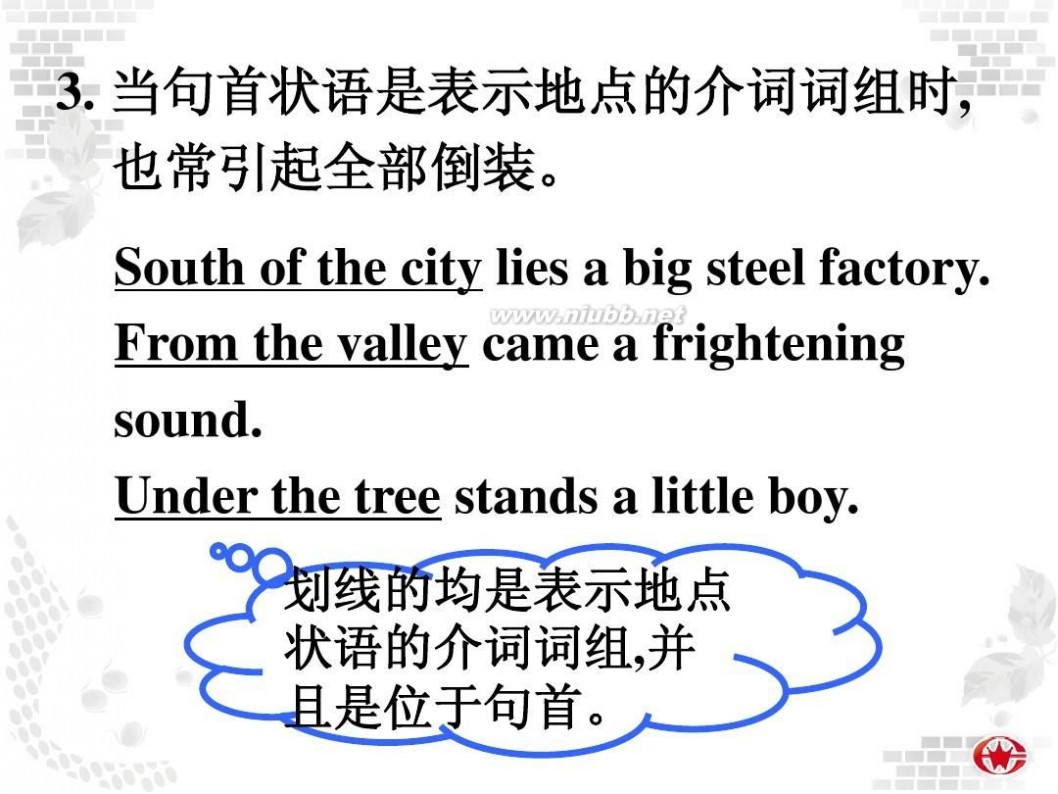
倒装句 最好倒装句讲解

倒装句 最好倒装句讲解
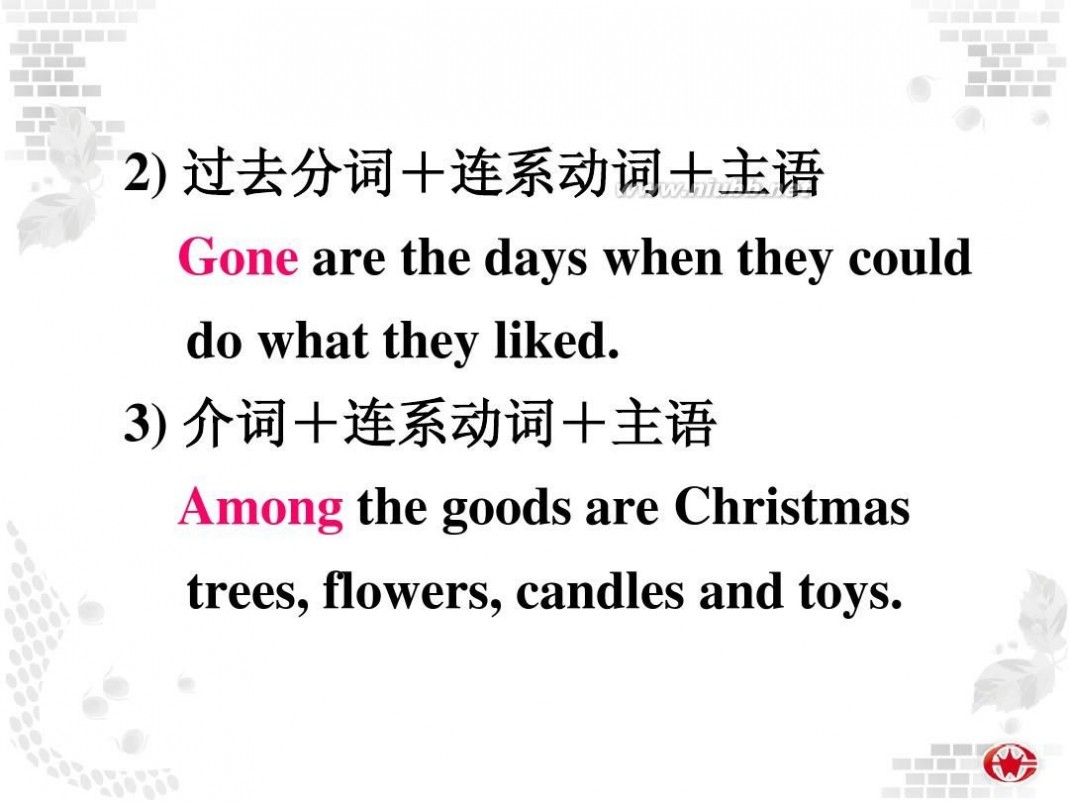
倒装句 最好倒装句讲解
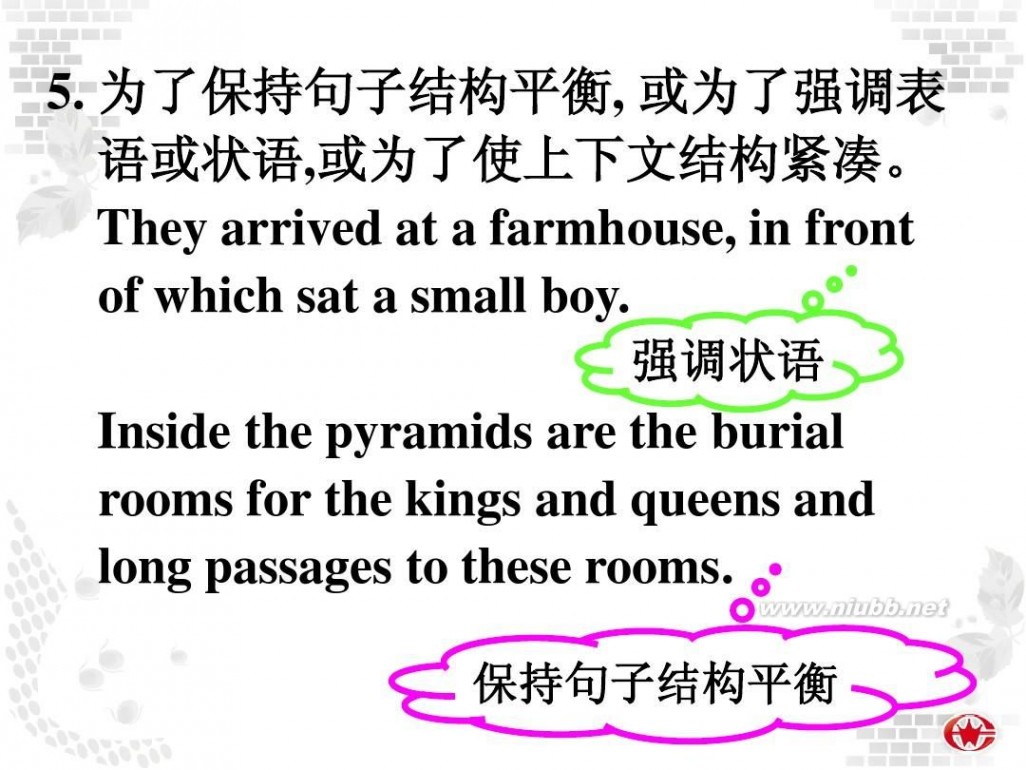
倒装句 最好倒装句讲解
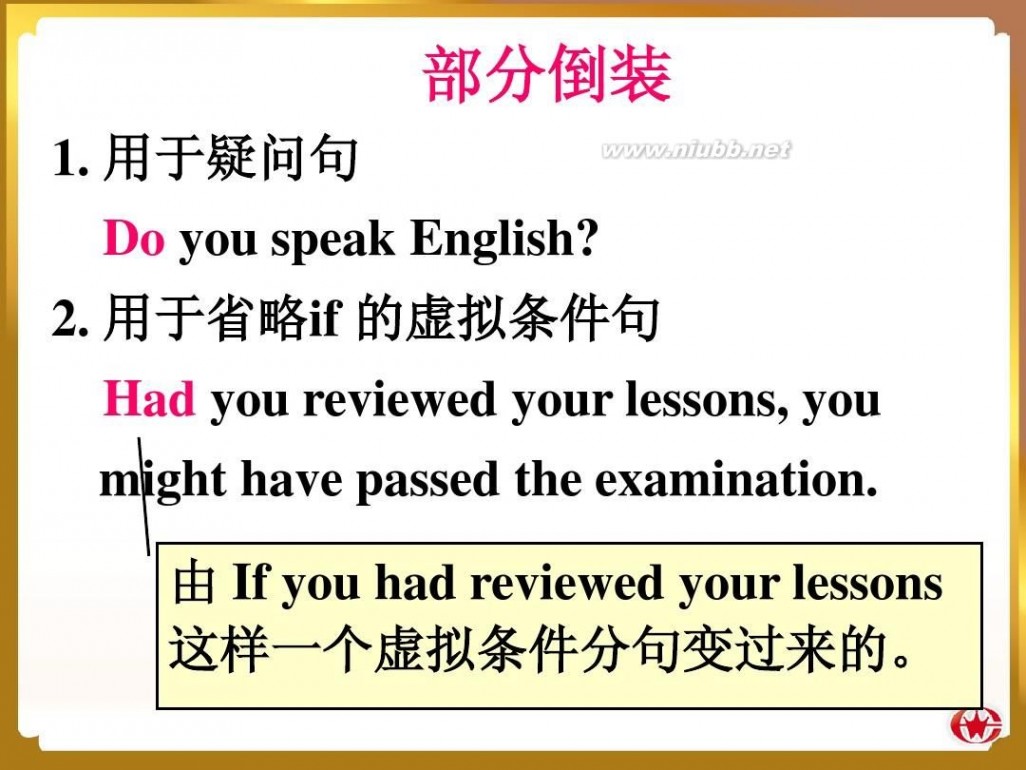
倒装句 最好倒装句讲解
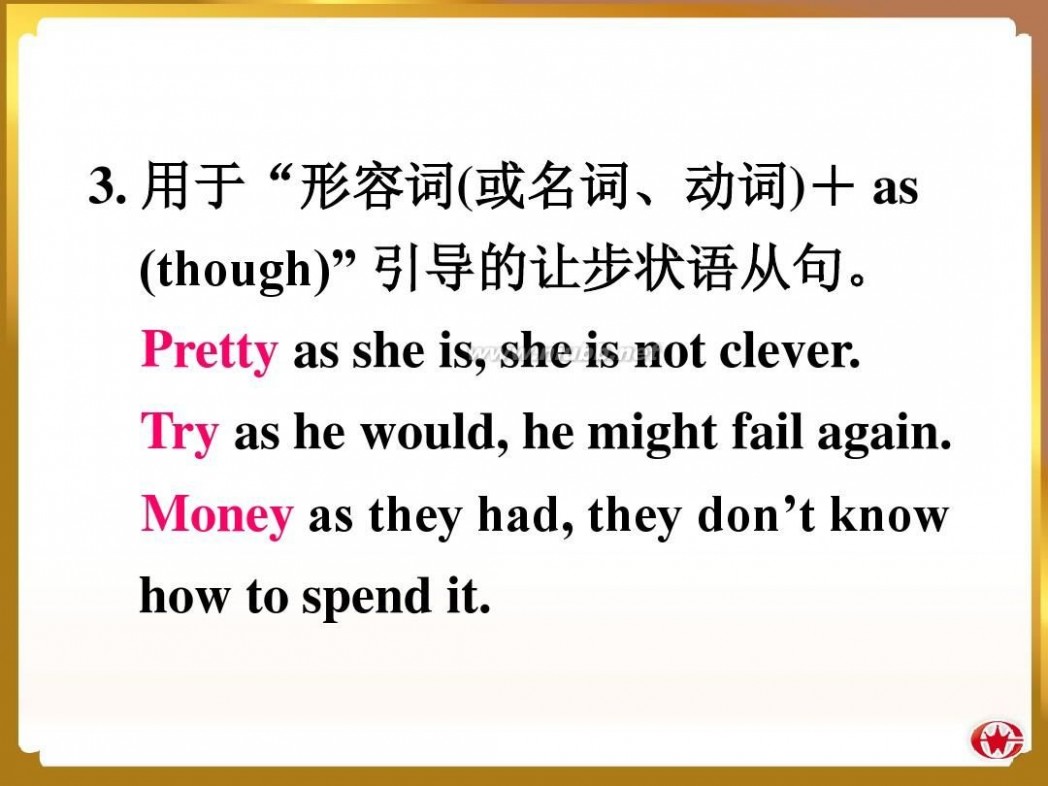
倒装句 最好倒装句讲解
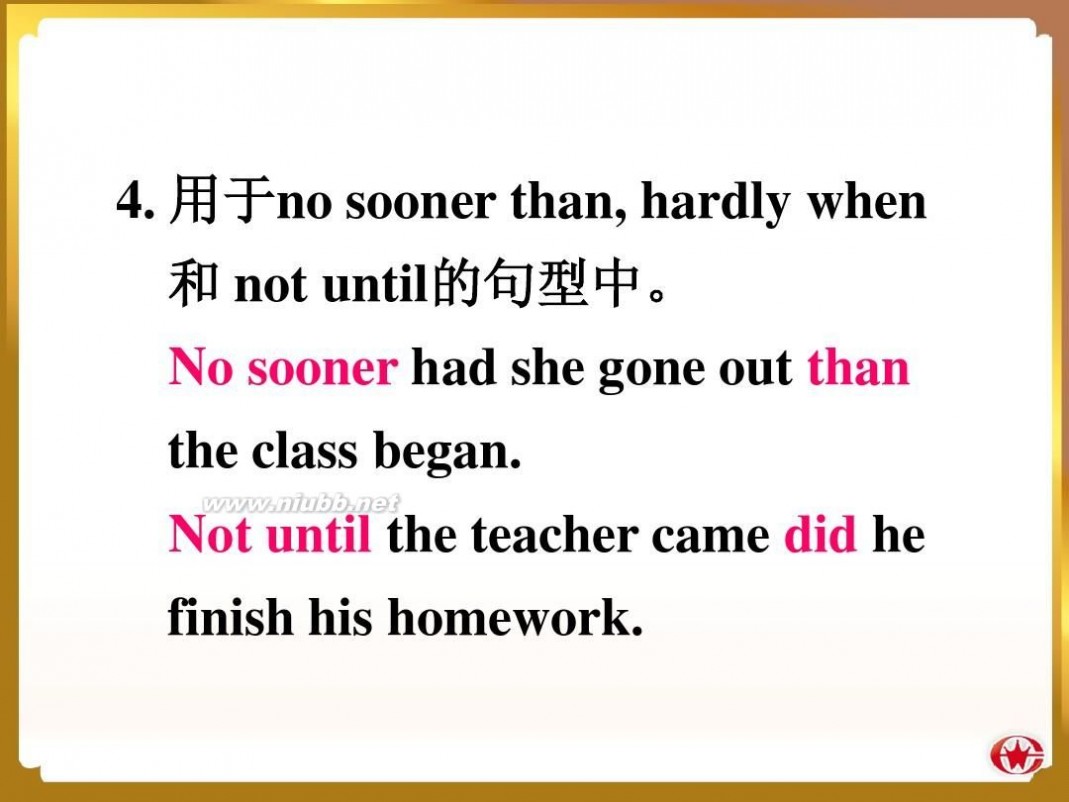
倒装句 最好倒装句讲解

倒装句 最好倒装句讲解
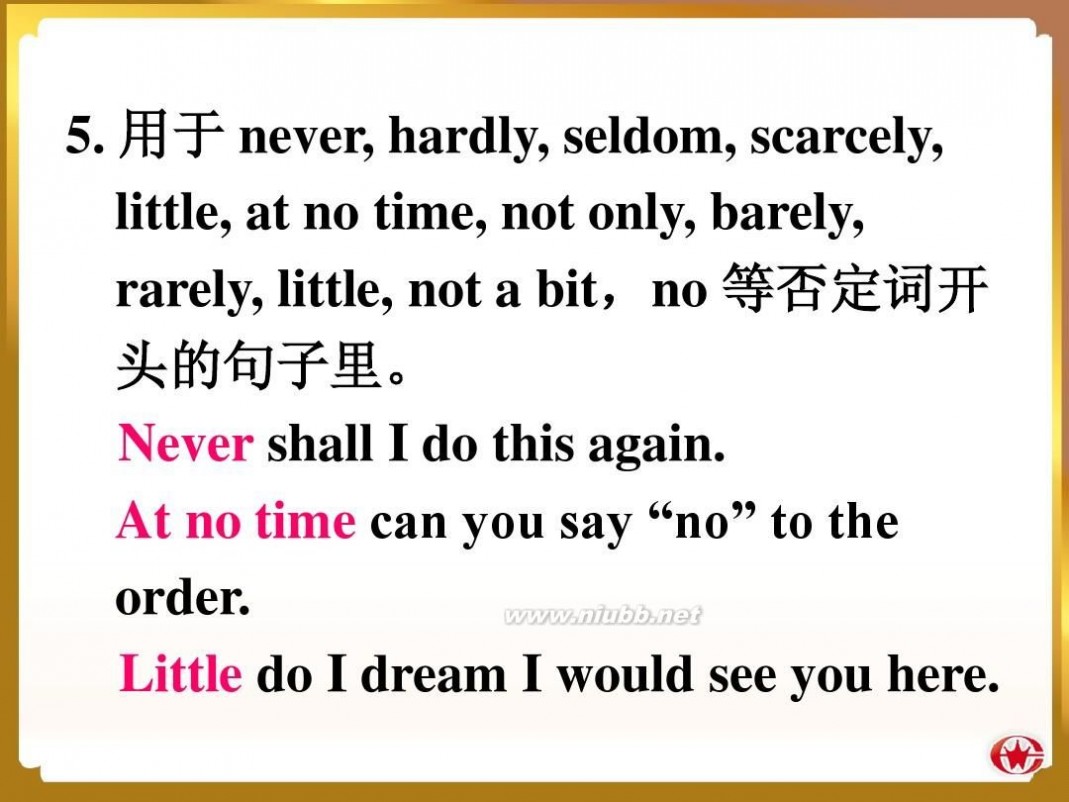
倒装句 最好倒装句讲解

倒装句 最好倒装句讲解
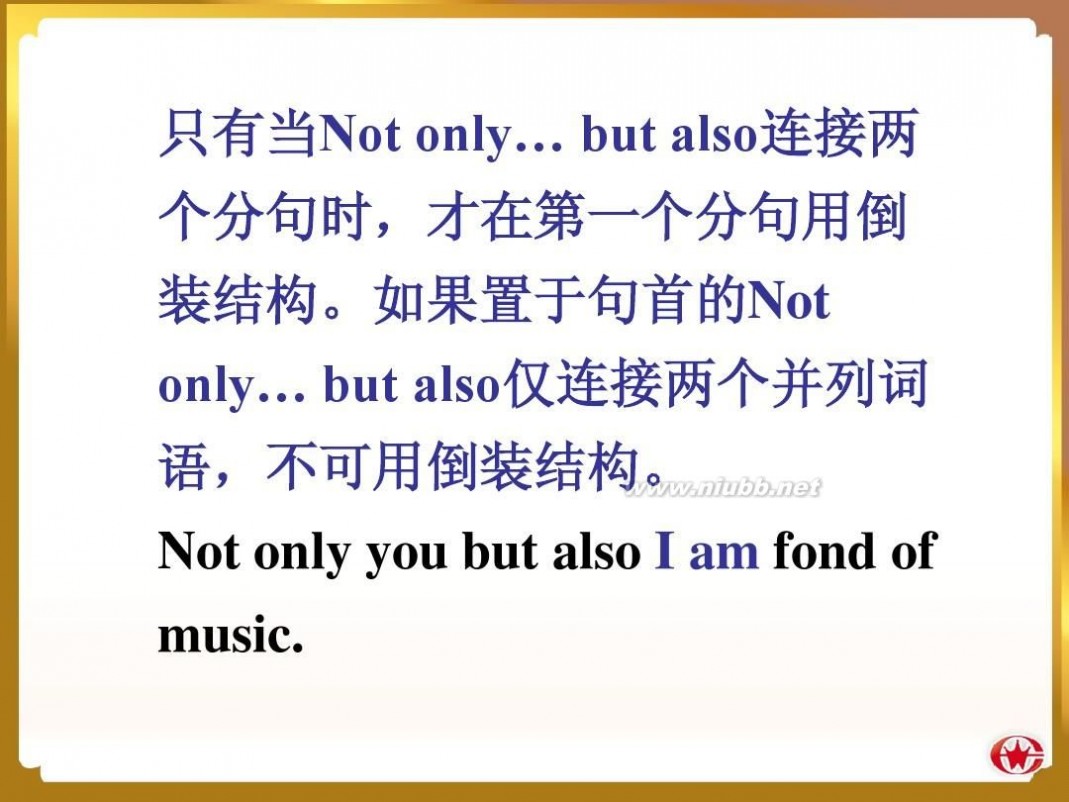
倒装句 最好倒装句讲解
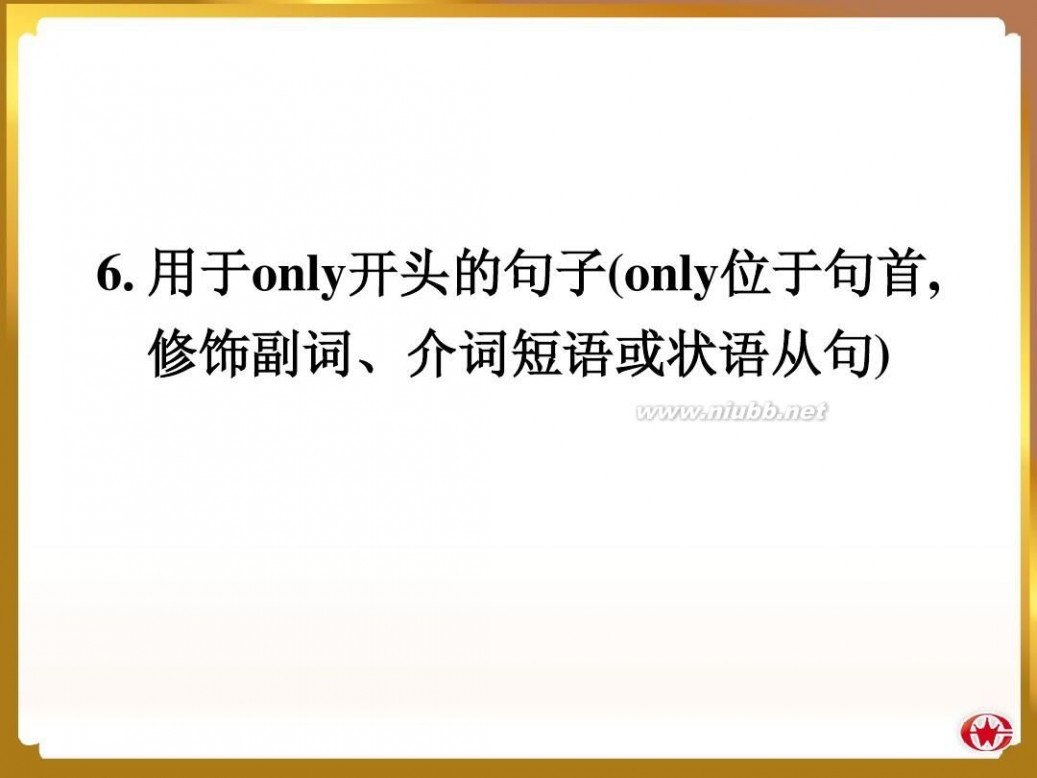
倒装句 最好倒装句讲解

倒装句 最好倒装句讲解
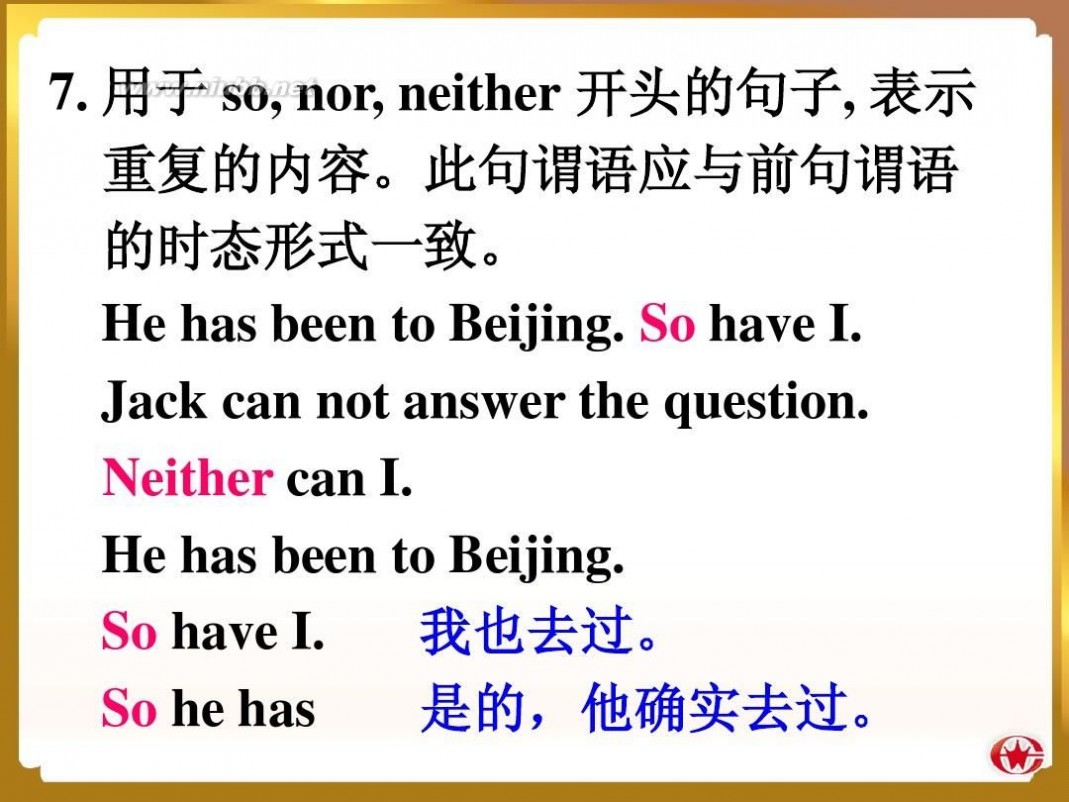
倒装句 最好倒装句讲解
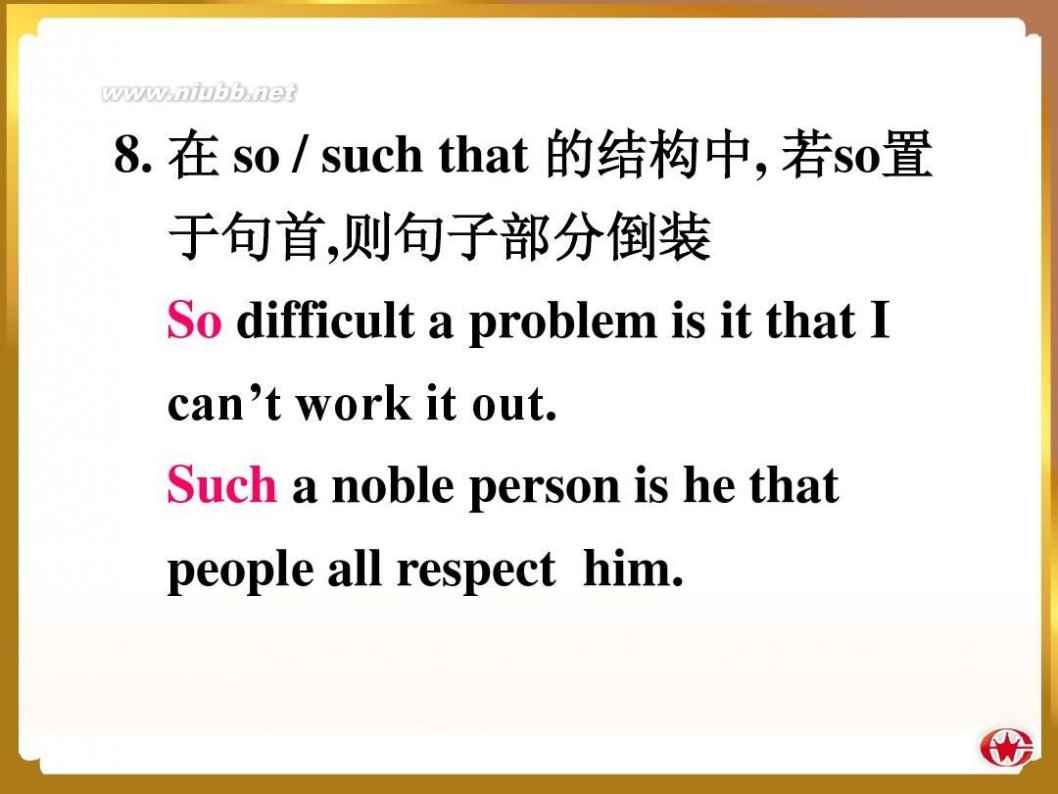
倒装句 最好倒装句讲解

倒装句 最好倒装句讲解
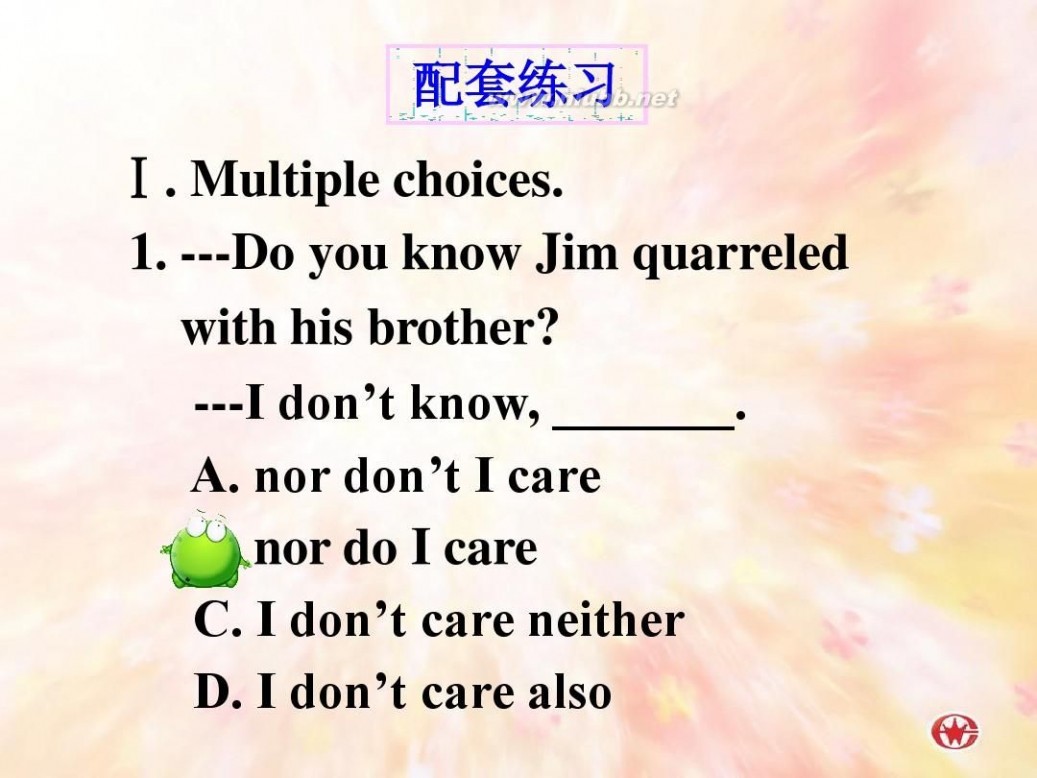
倒装句 最好倒装句讲解
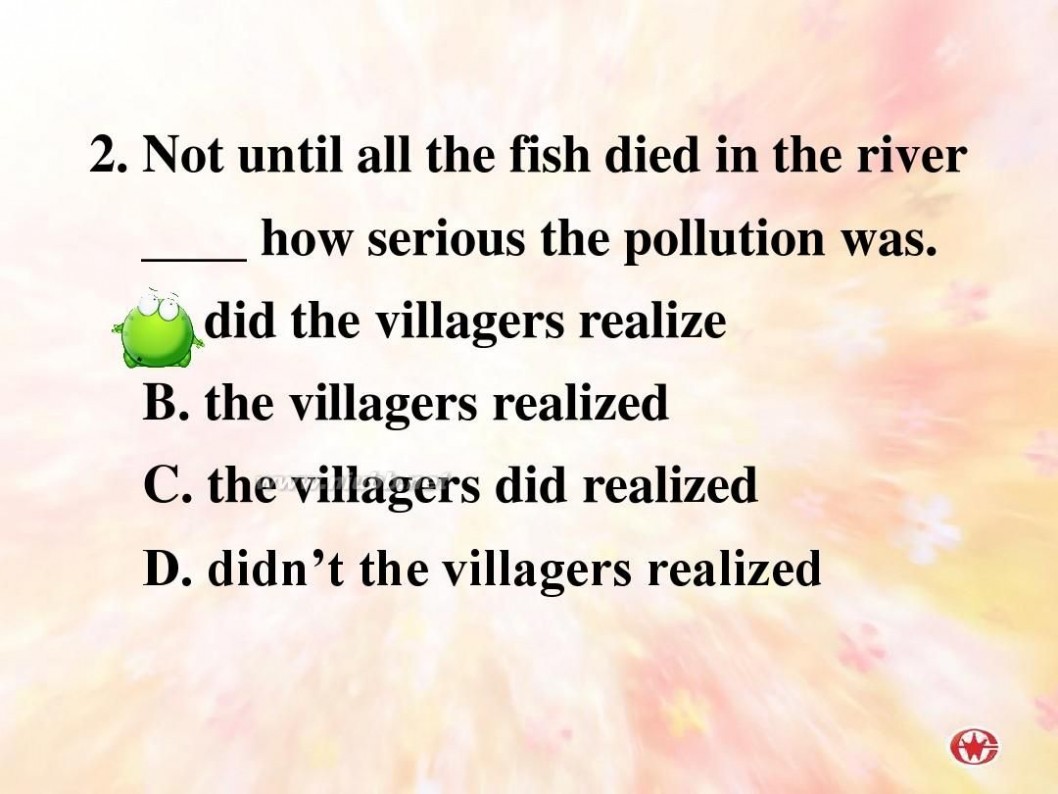
倒装句 最好倒装句讲解
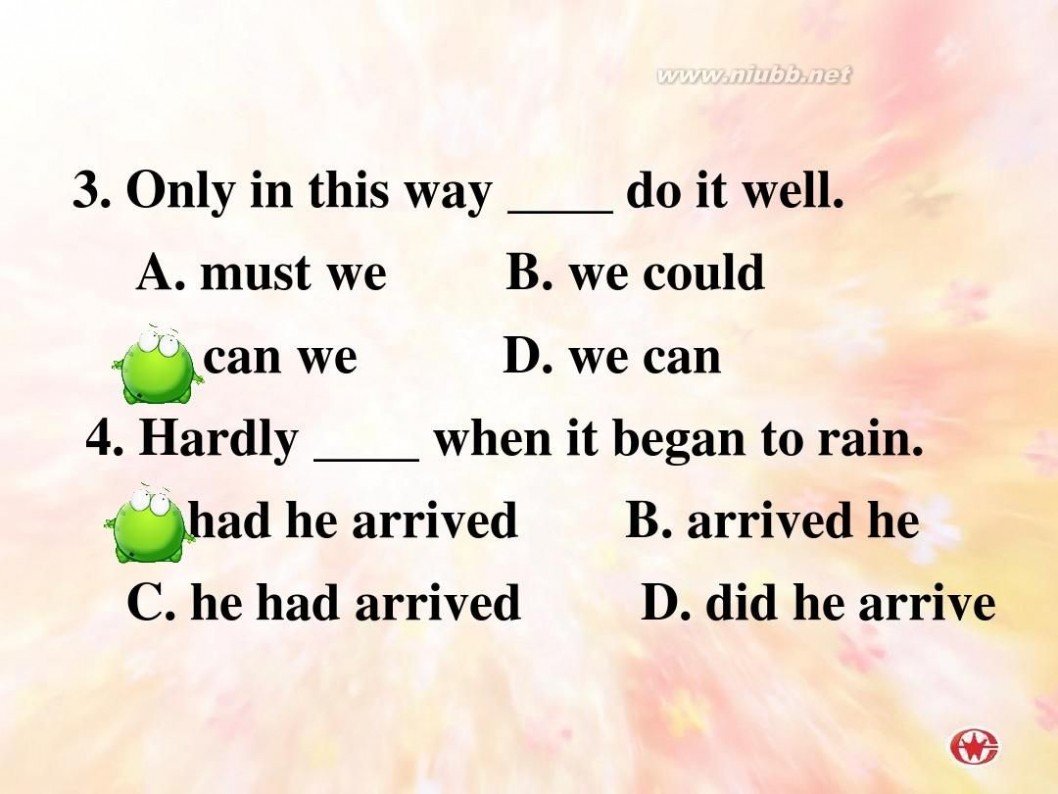
倒装句 最好倒装句讲解

倒装句 最好倒装句讲解
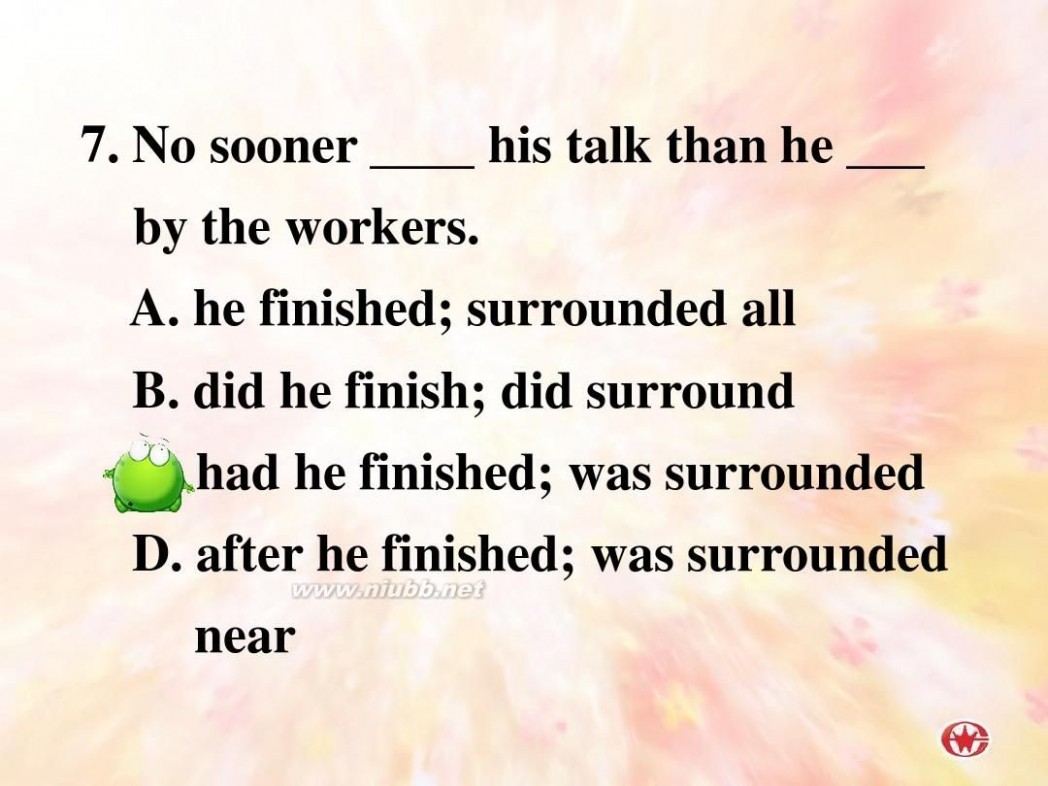
倒装句 最好倒装句讲解
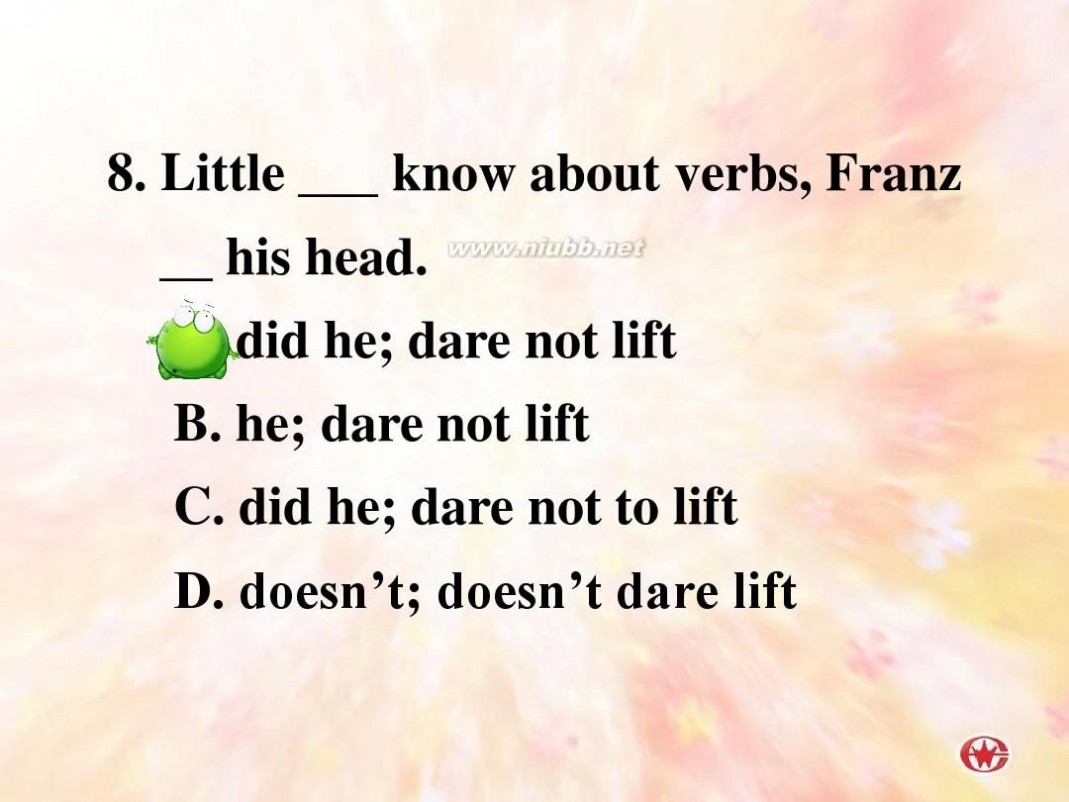
倒装句 最好倒装句讲解
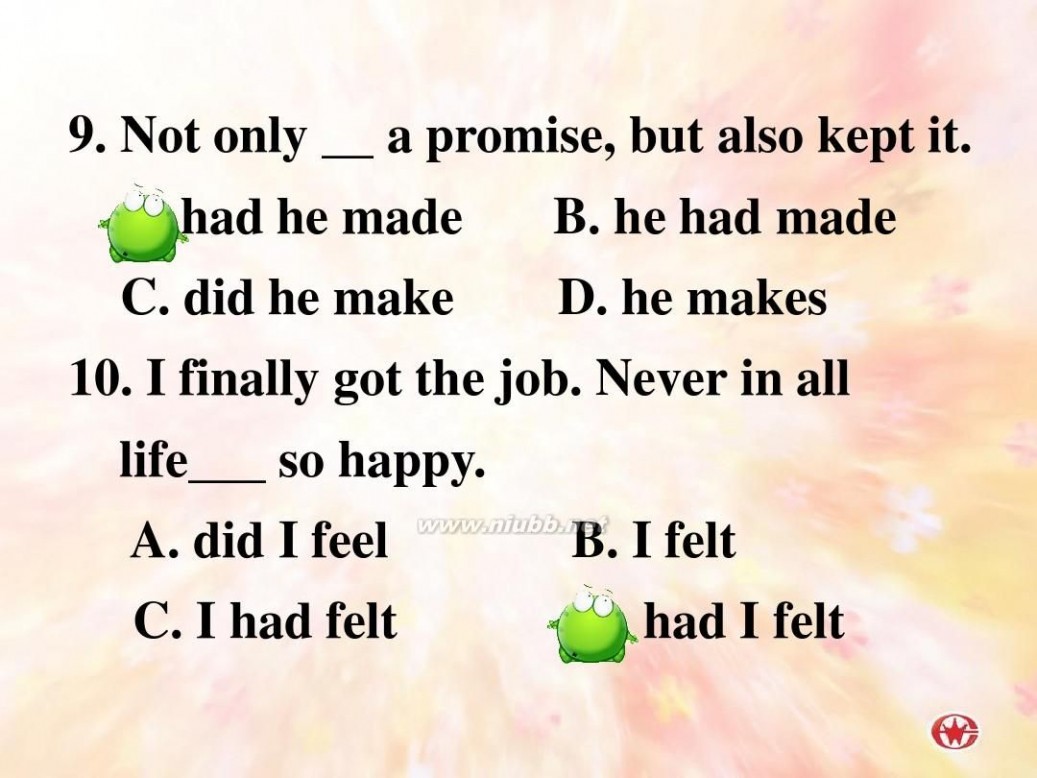
倒装句 最好倒装句讲解
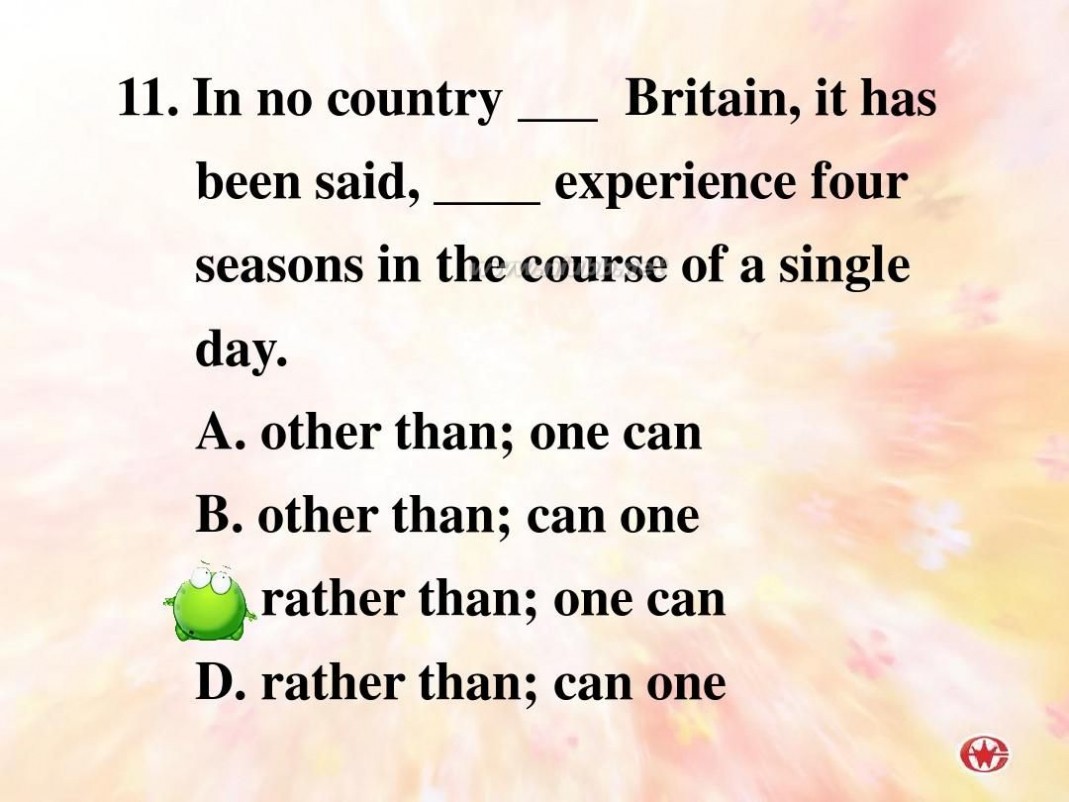
倒装句 最好倒装句讲解

倒装句 最好倒装句讲解
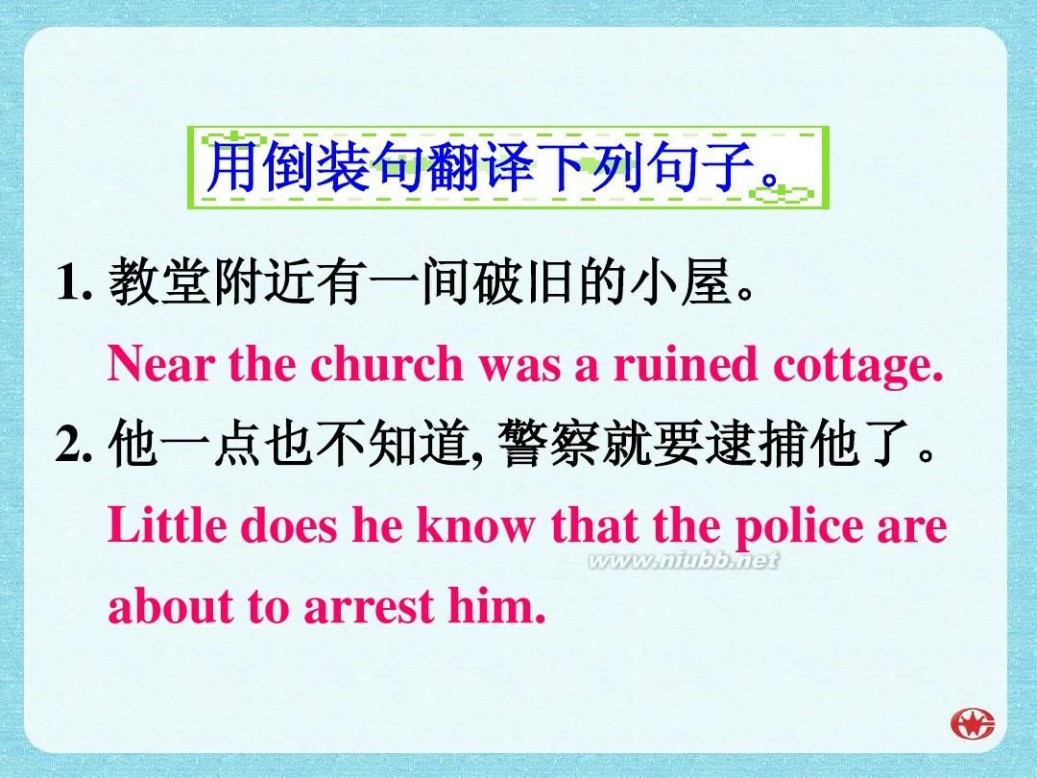
倒装句 最好倒装句讲解
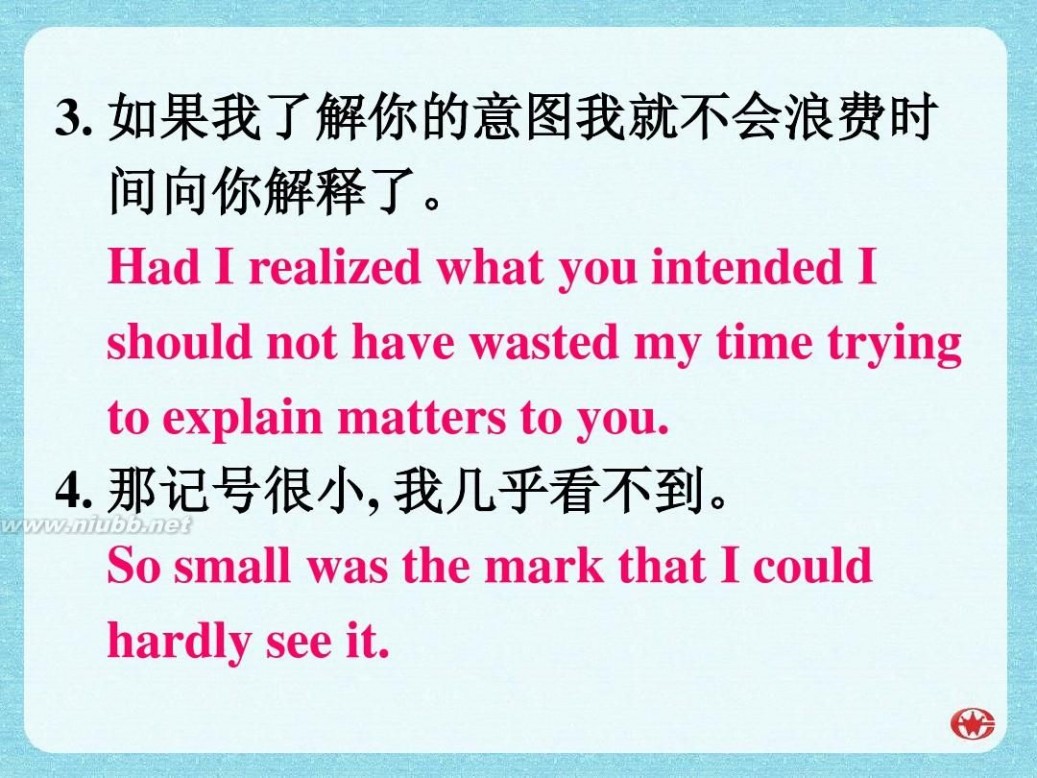
倒装句 最好倒装句讲解
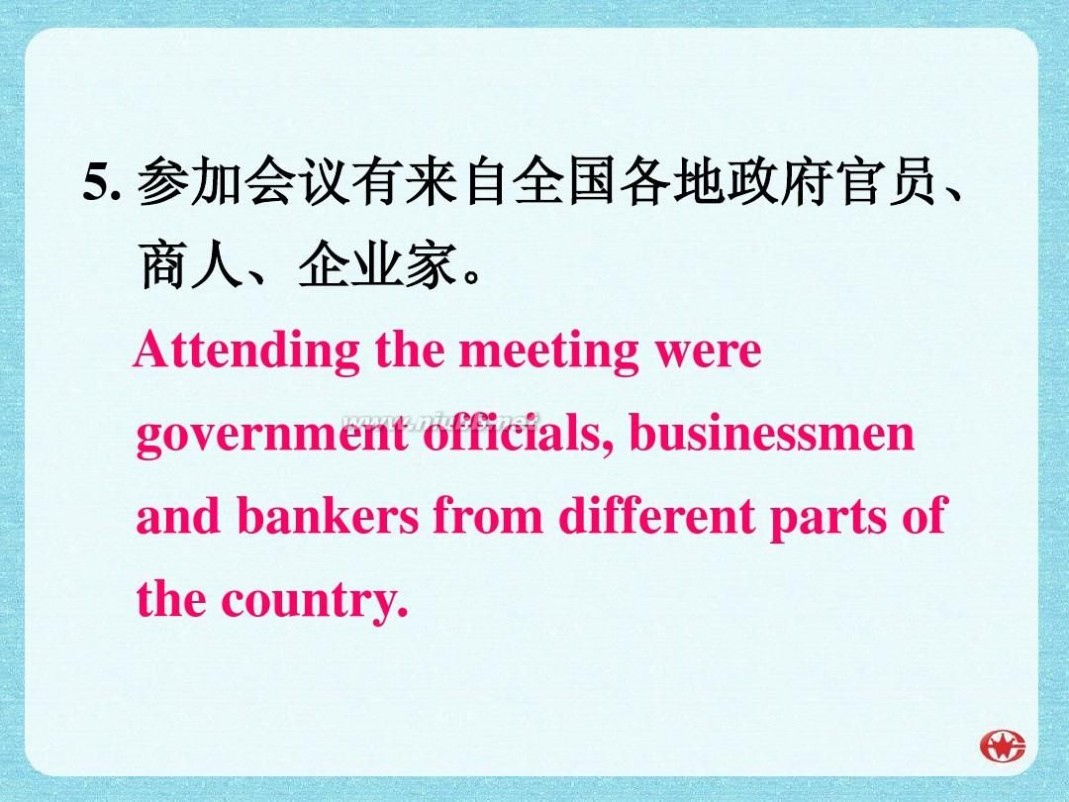
倒装句 最好倒装句讲解

倒装句 最好倒装句讲解
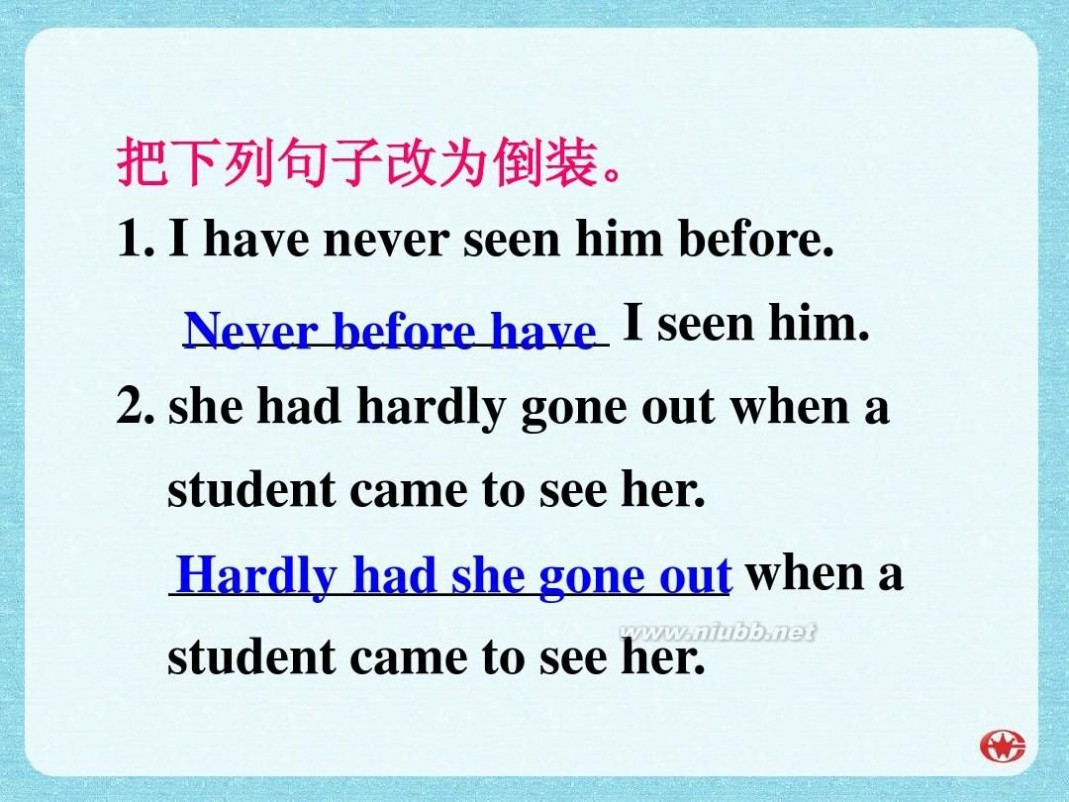
倒装句 最好倒装句讲解

倒装句 最好倒装句讲解
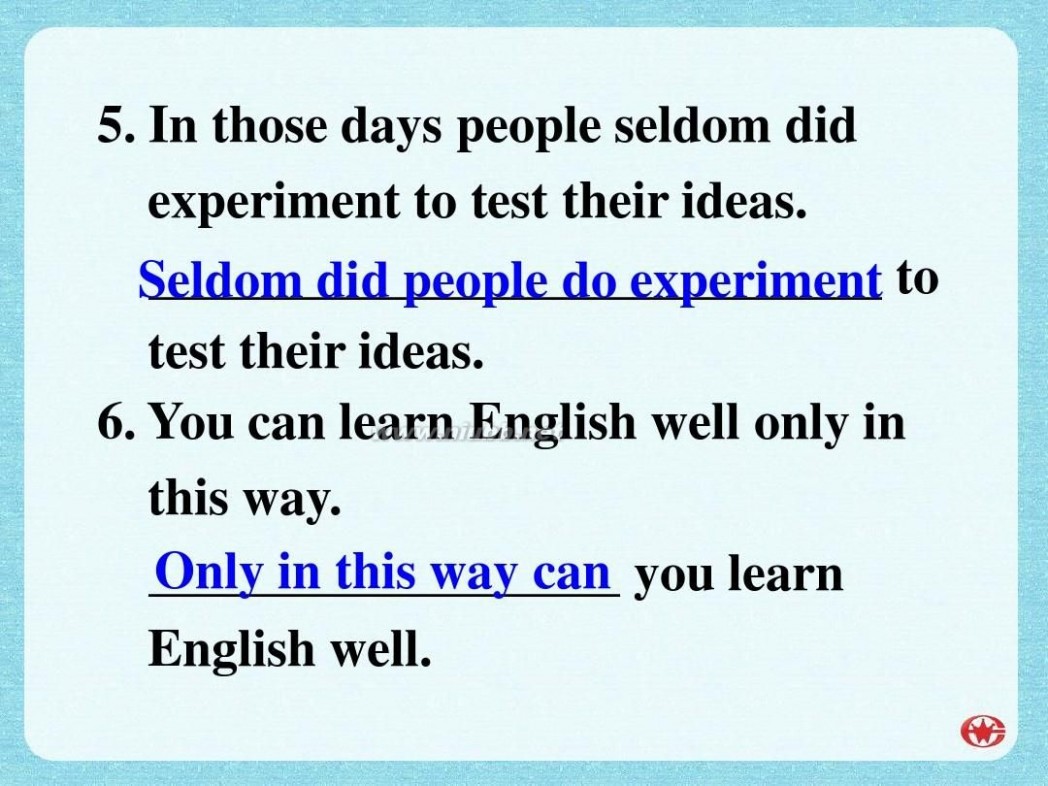
倒装句 最好倒装句讲解

倒装句 最好倒装句讲解
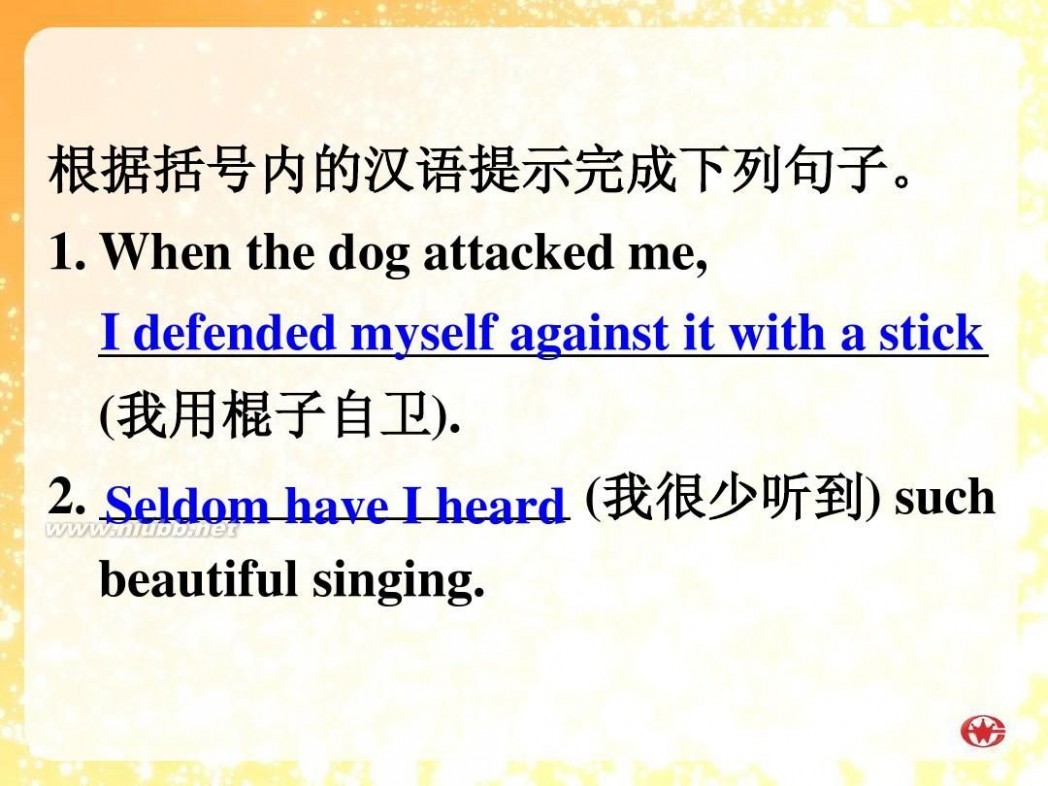
倒装句 最好倒装句讲解

三 : 帮我讲解一下倒装句,全部倒装和部分倒装
帮我讲解一下倒装句,全部倒装和部分倒装
全部倒装和部分倒装用法详解
一、使用全部倒装的情况
1.在there be/lie/stand/live/seem/appear/exist/come/go/seem句型中.如:
There goes the ambulance.救护车来了.
2.表示地点、方向、时间的副词(here,out,in,up,down,back off,away,now,then等)位于句首时.谓语动词多为表示运动的不及物动词(go,come,leave,move,run,rush,ny,jump等).如:
Here is a telegram for you.这儿有你一封电报.
Down jumpedthe man from the horse.那人从马上跳下来.
在上述情况中,主语是代词时,则不用倒装.如:
Here you are.给你.
In he came and the meeting began.他进来,会议就开始了.
3.表示地点的介词短语位于句首时.如:
Between the two buildings stands a tall pine.两座楼之间有棵大松树.
4.直接引语的部分或全部位于句首时,点明说话人的部分主谓语要倒装.如:
"Are you listening to English on the radio?" said Mother.
但,引述动词后有间接宾语或状语时,不倒装.如:
5.在某些表示祝愿的句子中.如:
Long live our great country!伟大的祖国万岁!
二、使用部分倒装的情况
1.only修饰的状语(副词、介词短语或状语从句)位于句首时.如:
Only after three operations was he able to walk without sticks.做过三次手术之后,他才能不用拐杖行走.
Only with more practice can you pass the driving test.只有多练习你才能通过驾驶考试.
但only修饰主语时,则不倒装.如:
Only that girl knew how to work out the problem.只有那位女生知道怎样解那道题.
2.含有否定意义的副词(never,seldom,little,few,not,nowhere等)位于句首时.如:
Seldom in all my life have l met such a brave man.我一生很少见过这么勇敢的人.
Never did she care about her own safety,though she was in great danger herself.虽然她处于极大的危险之中,但她根本不顾自己的安全.
3.not until位于句首时.如:
Not until the early years of the 19th century did man know what heat is.直到19世纪初,人们才知道热是何物.
在复合句中,只有主句用倒装,until引导的从句不倒装.如:
Not until he loses his health will he give up drinking.他直到失去健康才会戒酒.
4.在no sooner...than...,hardly/scarccly/barely...when...结构中,前面部分位于句首时,其后的分句要部分倒装(谓语用过去完成时).如:
Hardly had the baby seenthe dogwhen she cried.那女婴一看到狗就哭了起来.
NO sooner had the interpreter returned home than he was told to go to another country.那位翻译刚踏进国门就又受命要去他国.
5.not only...(but also)...位于句首引导两个分句时,前一个分句中的主谓要采用部分倒装,第二个分句则不倒装.如:
Not only does he teach in school,but hewrites novels.他不但在学校教书,而且还写小说.
Not only did she speak correctly,but also she spoke fluently.她不但说得正确,而且说得流利.
6.so/neither/nor开头的句子,说明前面的内容也适用于后者时,用倒装句“so/neither/nor+be/have/助动词/情态动词+主语”.如:
She hasbeen to Dalian and so have I.她去过大连,我也去过.
John can't speak Japanese,nor can Helen.约翰不会讲日语,海伦也不会.
但同意对方的看法,表示“是的、确实”之意时,用“so+主语+be/have/助动词/情态动词”句式,即主谓不倒装.目前考查这种句式的省份较多.如:—Maggie had a wonderful time at the pany.
—_______________,and so did I.
A.So she had B.So had she C.So she did D.So did she (05安徽)
7.as/thoush引导让步状语从句时,可将谓语部分的形容词/名词/动词等提到句首,采用部分倒装.如果位于句首的是单数可数名词,其前不加冠词.如:
Brave as they were,the danger made them afraid.尽管他们很勇敢,但这样的危险仍使他们感到畏惧.
8.在so/such...that...结构中,so/such及其修饰部分位于句首时,主句要用部分倒装.如:
So beautiful was the girl that she won the championship in the beauty contest.那女孩那么漂亮,她在选美比赛中获得冠军.
Such an instructive speech did he make that all the listeners were moved.他发表的演说那么有教育意义,以至于所有的听众都很感动.
9.在含有were/had/should虚拟条件句中,省去if,把这三个词放在句首时.如:
Were she here now(=If she were here now),she would take good care of her parents.如果她现在在这儿,她就能照顾她的父母了.
Had you attended the graduate ceremony(=If you had attended the graduate ceremony),I should haveseen you.要是你参加了毕业典礼,我就会见到你了.
10.在某些表示祝愿的句子中.如:
May you be happy!
本文标题:倒装句讲解-倒装句讲解61阅读| 精彩专题| 最新文章| 热门文章| 苏ICP备13036349号-1